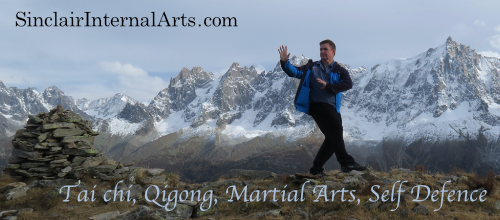This is about the two errors that can result from martial art training.
1. If you base your training too much on sparring, or on training techniques against a non-compliant opponent, they you will tend to associate the success of a technique with the effort you apply. You might fail to recognize the subtle biomechanics and mental processes that gave you the advantage in the first place, and only see the effort that finished the technique.
Advanced and martial art training methods (like those found in some schools of tai chi or other internal martial arts), aim to refine proprioception and improve the application of your mechanical advantage. This is where the extraordinary skill comes from. If you are not learning to make your techniques effortless and undetectable, then your attachment to inefficiency will defeat you. Internal martial art training can reveal the mechanical efficiency that such low level force obscures.
…however…
2. If you base your training too much on cooperative drills, then you might experience the effortlessness that only comes with perfect method and perfect technique, but your techniques will only work against people who have trained themselves to reveal your power to you. What this means is that you will get so good at lining things up with your opponent’s technique, that you will be thrown effortlessly every time. This does not prepare you to deal with a real non-compliant opponent. It also risks making you a self-defeating combatant. You get so accustomed to being thrown without effort, that the opponent, even one who has never trained this way, will be able to throw you with little to no effort. I have seen this with students who focused excessively on what some call “empty force”. I only need to think about pushing them and they go flying across the room.
So,
- on the one hand, low level martial artists use too much force too inefficiently because they depend on resistance for proprioception. But that kind of dependence on force deludes, makes you inefficient, and gives the mechanical advantage to the opponent. A moderately skilled opponent will defeat you with your own force. Advanced training refines proprioception in order to liberate you from this delusion.
- On the other hand, students who incorrectly train effortlessness, will create conditions where they apply the opponent’s force to themselves. The opponent doesn’t need to use your force against you because you will be too busy using their force against yourself.
Students of external martial artists tend to take too much credit for their own success. Students of internal martial arts tend to give the opponent too much credit for winning.
Internal training includes the practice of subtlety and mechanical efficiency. A training partner often cooperates to help you experience effortless power. But Tai chi is supposed to teach you to effortlessly manipulate the opponent, not to be effortlessly manipulated. It is wrong or to be attached to the use of inefficient force, but it is equally wrong to do all the opponent’s work for them.
Ian Sinclair teaches tai chi and tuishou to martial artists of all levels and all styles, from all over the world. Visit him in Orillia, or online. http://Sinclairinternalarts.com

Comments are closed.